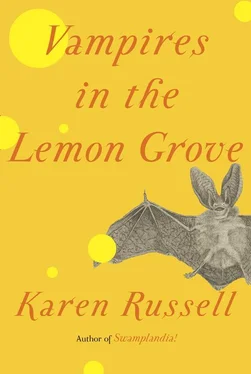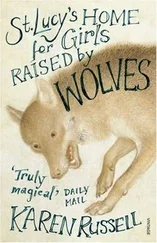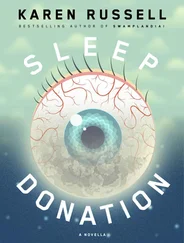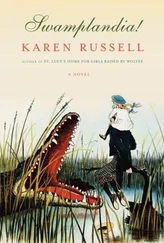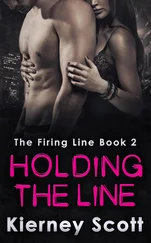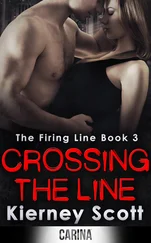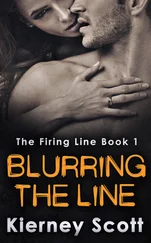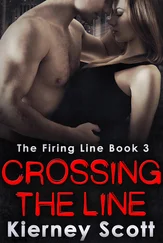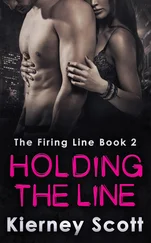Van Buren tries to hypnotize the child by rhythmically swishing his tail. “Look over here, girlie! Swish! Swish!” He shakes his head from side to side. Eisenhower steps gingerly into the looped strap of the child’s bag and drags it with his foreleg. He has it almost to the edge of his stall before she notices.
“Uncle Fitzy!” the girl yells. “Gingersnap is being bad!” Eisenhower hates it when she calls him Gingersnap. He complains about it with a statesman’s pomp: “Gentlemen, there exists no more odious appellation than”—nose crumpling, black lips curling—“Gingersnap.”
The girl walks forward and snatches her book bag back, but not before Eisenhower has shaken it upside down and kicked several of the books under a clump of hay. “Hurry,” he hisses, “before Fitzgibbons comes with the whip!”
The presidents crowd around the books. Literature, mathematics, science, cursive. No history book. The cursive book has fallen open to a page thick with hundreds of lowercase b s. Eisenhower sends the books flying with a swift kick from his right foreleg, disgusted. “Every subject but American history! What has become of our education system? What are they teaching children in schools these days?!” It’s an urgent question. What are they teaching children these days? And how is each president remembered? That’s the afterlife the presidents are interested in. Not this anonymous, fly-swatting limbo.
James Buchanan is busy rewriting his memoirs, Mr. Buchanan’s Administration on the Eve of the Rebellion . He is furious that none of the other presidents ever read the original while they were alive. “Yeah, about that,” coughs Harding. “Pretty sure that’s out of print.”
It’s a labored process. Equine anatomy severely limits the kinds of letters the presidents can straight-leg into the dirt. Buchanan can draw an H , an F , an E , an A , a T , an I , an X with the meticulous action of his right hoof. Z , once you get the hang of it, is also quite easy. O s and U s and Ss are impossible. Ks and W s leave him shuddery and spent. Buchanan never questions his own record of the past; commas are tough enough, and he would have to break his leg to make a question mark. He is just now putting the finishing touches to Chapter Four. “Voilà, gentlemen! And now I will add a final paragraph of summation and then on to chapter … oh no !”
Fitzgibbons rolls one of his red fleet of tractors over Buchanan’s sod parchment, erasing even the prologue.
Rutherford used to believe it was the civic duty of every elected official to preserve a full record of his administration. While in office, he was a compulsive memoirist who filled dozens of journals with his painstaking schoolboy script. But now he has only a single use for the human alphabet. He hoofs messages in the rich loam behind the coop, too, but they are for one woman instead of posterity. L–L-L–L , he writes, by which he means Lucy .
Hunger and restraint
Rutherford is losing weight. He keeps the sheep near him all the time now, crooning to her through closed gums: “Lucy, Lucy, give me your answer, do, I’m half crazy …”
“Pipe down, Rutherford,” snaps Harding. “Stop giving that sheep your food, you idiot. You will starve to death if you keep it up.”
Rutherford ignores the other presidents and kneels next to the sheep. He smiles at the blue fleck of evidence that his wife is hiding somewhere inside this fleecy body. I know you, he whispers. He lets a brown apple plop into the sawdust between them. The sheep eats it with gusto, and Rutherford hopes this means his love is requited. In the morning, Fitzgibbons yelps when he discovers the sheep in the stall with Rutherford. “Sarge!” Fitzgibbons smacks a palm against his bald head. “What in the hell are you doing with that blind ewe? That is spooky, Sarge. That is goddamn unnatural. You feeling sick, Sarge? You get into some rat poison or something?” Fitzgibbons approaches Rutherford with the oiled halter. “Come along now,” he grunts. “Open up …” He jostles a carrot around Rutherford’s stubbornly pursed lips. A second later the carrot has disappeared and Fitzgibbons is cursing and hopping on one foot. “Jesus!” he growls. “Sarge, you old fleabag, you bit me!”
I am becoming very clever at getting the carrot without opening up for the bit , Rutherford thinks. He keeps the carrot in a pouch in his cheek, a gift for Lucy. At the games of hunger and restraint, my fellow countrymen, I am becoming excellent .
Campaign promises
In the yard, the other presidents are still hungry for power. They are practicing for the return to Washington. Adams is so starved for dominion that he begs the girl to allow him to represent her interests to her uncle Fitzgibbons. “Elect me to take part in the public life of your Barn, young lady, and I shall act a fearless, intrepid, undaunted part, at all hazards …”
“Ha-ha, Mister Pretty, you are so noisy today!” The girl hums a nonsense tune as she plaits Adams’s tail with geraniums.
Martin Van Buren is barn sour but even he shouts out impossible promises at the turkeys from the dim interior of his stall: “You are my constituents, my turkeys,” Van Buren neighs, “and the love I feel for you is forever.” The turkeys promenade around the yard and ignore him. Rutherford wonders if they, too, have human biographies hidden beneath their black feathers. The presidents spend a lot of time talking about where the other citizens of the Union might have ended up. Wilson thinks the suffragettes probably came back as kicky rabbits.
“I don’t understand,” Rutherford says. “Don’t you gentlemen realize that you are stumping for nothing? What sort of power could you hope to achieve out here?”
Rutherford was ready for his term to be over. He was happy to keep his promise not to run for reelection. He had been a reluctant incumbent in the first place, unwilling to leave his war post to take a furlough for the stump. Mark Twain campaigned for him, and still he never expected to win. Rutherford never knew a generous margin in the whole of his life. His victory was the most disputed in American history. A single electoral vote would have given the presidency to Samuel J. Tilden. “It was a squeaker.” Eisenhower nods. “I remember studying it in school.” Often, Rutherford wonders what would have happened if Tilden had won. He wonders if he has unjustly displaced Tilden from this stall in the blank country sun of the afterlife.
If we could just reach a consensus that this is Heaven , Rutherford snorts, we could submit to it, the joy of wind and canter and the stubbed ashy sweetness of trough carrots, burnished moons, nosing the secret smells out of grass. I would be free to gallop . The only heaven that Rutherford has known in the Barn comes in single moments: a warm palm on his nose, fresh hay, a tiny feast of green thistle made nearly invisible by the sun. At dawn, Heaven is a feeling that comes when the wind sweeps the fields. Heaven is this wind, Rutherford knows for an instant, bending a million yellow heads of wheat.
By nightfall, though, the wheat has straightened, and the whole notion of an afterlife strikes Rutherford as preposterous. “All these arguments are nonsense,” he confides to Lucy. “We are all still alive. This is still America. The stars look the same,” he continues, “and we are fed. We are here.”
Shorn
One afternoon, the sheep is not waiting for him in his stall.
“Rutherford,” Jackson sniggers from the pasture, “take a gander at this. Looks like Fitzgibbons is doing something very untoward to your wife.”
Читать дальше
